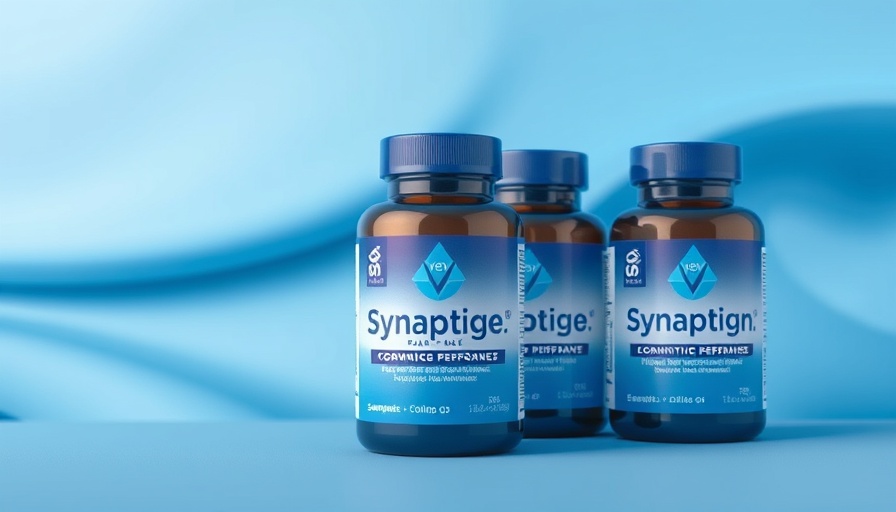
Rethinking Cognitive Performance: The Synaptigen Revolution
In a world where rapid decision-making is crucial for success, the focus on cognitive performance has never been more important. Synaptigen emerges as a beacon for those seeking enhanced brain health, particularly for executives, CEOs, and business leaders who continually push the limits of their mental faculties. This North Carolina-based biotech consultancy synthesizes an innovative approach to supplement development, emphasizing patient inputs and scientific rigor, which is increasingly rare in today's market dominated by quick-fix solutions.
What is Synaptigen?
Synaptigen is primarily a brain health supplement that claims to boost cognitive performance, memory retention, and mental clarity. Unlike typical stimulants that offer fleeting bursts of energy, it is crafted with a blend of natural nootropics, adaptogens, and essential nutrients. What sets Synaptigen apart is its scientific foundation—each component is selected based on existing research aimed at supporting long-term cognitive health.
The Mechanism Behind Synaptigen
What truly differentiates Synaptigen is its multi-pathway approach, which enhances brain function from various angles. This means it addresses widespread concerns about cognitive performance effectively:
- Enhancing Neurotransmitter Function: The supplement enhances neurotransmitters like acetylcholine, dopamine, and serotonin, critical for learning, mood, and focus. Ingredients like Alpha-GPC and Citicoline fortify acetylcholine levels, leading to sharper concentration and quicker recall.
- Stimulating Neuroplasticity: Synaptigen includes Lion’s Mane Mushroom and Bacopa Monnieri to promote nerve growth factor (NGF), enabling the brain to adapt and make new connections—an essential feature for anyone looking to stay relevant in the fast-paced business environment.
- Combating Mental Fatigue: Ingredients such as Rhodiola Rosea and Coenzyme Q10 address mental fatigue by improving cellular energy production, ensuring you stay alert and resilient throughout long meetings or brainstorming sessions.
- Protecting Long-Term Brain Health: The formula's antioxidants, including Curcumin and Resveratrol, work effectively against cognitive decline, making it suitable for users of all ages, particularly older professionals keen on preserving their mental acuity.
- Boosting Cerebral Blood Flow: Enhancing blood circulation to the brain through Ginkgo Biloba and Vinpocetine ensures better delivery of oxygen and nutrients, leading to enhanced mental clarity and faster processing speeds.
Long-term Thinking: A Cognitive Advantage
Cognitive performance extends beyond immediate gains; it is an investment in a leader's future. The fast-paced nature of corporate environments demands professionals remain one step ahead. Synaptigen allows for this by providing sustained cognitive enhancement, encouraging leaders to engage in forward-thinking strategies rather than reactive decision-making. This strategic approach is vital in high-stakes environments where clarity and speed are paramount.
The Emotional Component of Cognitive Function
As business leaders, much of your effectiveness hinges on emotional intelligence and resilience. Synaptigen addresses these factors by enhancing mood-regulating neurotransmitters, ensuring that decision-making is not just rational but also emotionally grounded. For executives who regularly contend with stress, maintaining a balanced mood is as crucial as making sharp decisions.
Counterarguments: Are Brain Supplements Worth It?
While many endorsements of cognitive supplements, including Synaptigen, are positive, skeptics often raise valid concerns regarding their efficacy. Various studies point to a lack of rigorous scientific backing for many brain health products. It's important to approach these supplements critically, using them as tools rather than relying solely on them. Supplementation should complement a holistic approach to cognitive wellness that includes proper nutrition, exercise, and mental training.
Taking Action: Making the Right Choices in Cognitive Support
As decision-makers, understanding the landscape of cognitive performance solutions like Synaptigen can empower you to make informed choices. If you're considering integrating a supplement into your cognitive health regimen, seek products grounded in science and responsive to user feedback. This ensures that what you incorporate into your daily routine aligns with your professional demands and personal health objectives.
For business leaders looking to stay ahead in cognitive performance, consider evaluating your options with an open mind. Engaging with new products like Synaptigen may be the step needed to maximize your professional capabilities and maintain an edge in a competitive market.
 Add Row
Add Row  Add
Add 




Write A Comment